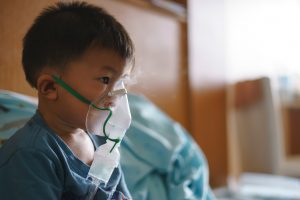 RSV (respiratory syncytial virus) is a respiratory illness that is typically most prevalent during the fall, winter, and early spring seasons. Most children born in the United States will have experienced it at some point before their second birthday.
RSV (respiratory syncytial virus) is a respiratory illness that is typically most prevalent during the fall, winter, and early spring seasons. Most children born in the United States will have experienced it at some point before their second birthday.
The virus often presents symptoms similar to those of a cold, including a runny nose, coughing or wheezing, fever, and decreased appetite. These symptoms usually appear approximately four to six days after infection, but may not appear all at once.
While it usually does not lead to hospitalization, RSV can be particularly dangerous to children if it causes bronchiolitis or pneumonia to develop; it’s the most common cause of both of these illnesses in children under the age of one. If an infant develops either of these conditions, becomes dehydrated, or experiences significant difficulty breathing, the situation could become more serious and require hospital care.
RSV can also be especially dangerous for older adults, accounting for approximately 177,000 hospitalizations in adults over the age of 65.
The virus is usually spread through:
- Bodily fluids such as mucus, saliva, or droplets
- Surfaces that have the virus on them
- Direct contact such as kissing an infected person
The best way to decrease the risk of an older adult or infant developing RSV is to prevent as many means of transmission as possible and promptly get them medical care if their symptoms seem to be worsening.
People and children who are at risk of developing severe cases of RSV should:
- Avoid close contact with infected people and, if possible, close-contact settings such as daycare centers where RSV can more easily spread
- Frequently wash their hands with soap and water for 20 seconds and refrain from touching their face until after they’ve done so
If you are sick with RSV, you should:
- Avoid close contact with non-infected people
- Frequently clean surfaces you’ve touched with disinfectant
- Wear a mask and/or cover coughs and sneezes with a sleeve or tissue
- Frequently wash your hands with soap and water for 20 seconds
If you or someone you know has developed RSV symptoms that require medical attention, you can schedule an appointment at Flushing Hospital Medical Center’s Ambulatory Care Center by calling (718) 670-5486 now.
All content of this newsletter is intended for general information purposes only and is not intended or implied to be a substitute for professional medical advice, diagnosis or treatment. Please consult a medical professional before adopting any of the suggestions on this page. You must never disregard professional medical advice or delay seeking medical treatment based upon any content of this newsletter. PROMPTLY CONSULT YOUR PHYSICIAN OR CALL 911 IF YOU BELIEVE YOU HAVE A MEDICAL EMERGENCY.
